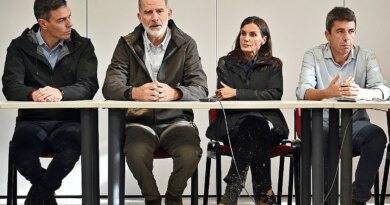3 Columbia officials removed from posts over texts that ‘touched on ancient antisemitic tropes’

NEW YORK — Columbia University said Monday that it has removed three administrators from their positions and will keep them on leave indefinitely after finding that text messages they exchanged during a campus discussion about Jewish life “disturbingly touched on ancient antisemitic tropes.”
In a letter to the Columbia community, university president Minouche Shafik and provost Angela Olinto said the administrators have been permanently removed from their positions at the university’s undergraduate Columbia College. The college’s dean, who previously apologized for his part in the text exchanges, will remain in that role.
The university will also launch a “vigorous” antisemitism and antidiscrimination training program for faculty and staff in the fall, as well as related training for students, Shafik said.
The administrators, whom the university did not identify by name, were first put on leave last month after a conservative news outlet published images of what it said were text messages they exchanged while attending the May 31 panel discussion “Jewish Life on Campus: Past, Present and Future.”
The House Committee on Education and the Workforce published some of the messages last week.
“This incident revealed behavior and sentiments that were not only unprofessional, but also, disturbingly touched on ancient antisemitic tropes,” Shafik wrote. “Whether intended as such or not, these sentiments are unacceptable and deeply upsetting.”
Shafik said the text messages conveyed a “lack of seriousness about the concerns and the experiences of members of our Jewish community that is antithetical” to the university’s values and standards.
Olinto wrote that the administrators’ conduct was “wrong and contrary to the mission and values of our institution. It revealed, at best, an ignorance of the history of antisemitism.”
The news outlet, the Washington Free Beacon, published examples on June 12 and 21 of what it said were some of the text exchanges.
Among them was a message suggesting that a panelist could have used recent campus protests as a fundraising opportunity and another that appeared critical of a campus rabbi’s essay about antisemitism.
The panel about antisemitism was held a month after university leaders called in police to clear pro-Palestinian protesters out of an occupied administration building and dismantle a tent encampment that had threatened to disrupt graduation ceremonies.
The police action came amid deep divisions on campus as to whether some of the protests against Israel’s military campaign in Gaza have been antisemitic.
Columbia College Dean Josef Sorett, whose text messages were among those published by the Free Beacon, will continue to lead the college after apologizing and committing to working to fix damage caused by the text exchanges, Olinto said. He and his administration will be expected to “deliver concrete change in combating antisemitism and discrimination and creating a fully inclusive environment,” Olinto wrote.
“While not intended as such, some of the text messages exchanged may call to mind antisemitic tropes,” Sorett said in a letter Monday to the Columbia College community. “Any language that demeans members of our community, or divides us from one another, is simply unacceptable.”
“I am deeply sorry that this happened in a community that I lead- and, that I was part of any of the exchanges, and I pledge to spearhead the change we need to ensure this never happens again,” Sorett continued. He said “the loss of trust and the pain this incident has caused, particularly to the Jewish members of our community, must be fully repaired.”




